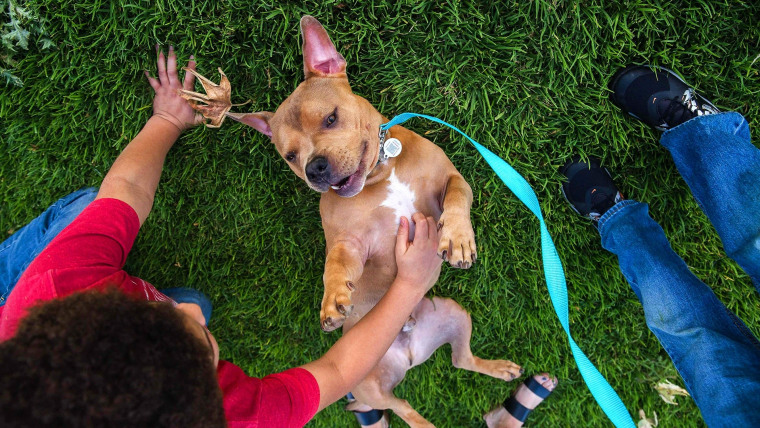Canine eggheads enjoy playing with toys and retrieving objects.

“Gifted” dogs, who have a rare talent for learning lots of words for objects easily, also turn out to be more playful than other dogs, a new study finds.
Prior research in humans has shown a link between playfulness and problem-solving abilities, so animal behavior researchers from Eötvös Loránd University in Budapest, Hungary, wondered if the same was true for rollicking pups.
What is a gifted dog? In the new study, it was Border collies who had proven in prior research that they were able to learn as many as 12 new words per week and then retain them for months.
To take a closer look at the possible association between giftedness and playfulness in dogs, Claudia Fugazza, a researcher in the university’s department of ethology (the study of animal behavior), and her colleagues asked the owners of 165 Border collies to fill out dog personality questionnaires. Twenty-one of the dogs were gifted and the other 114 were just randomly selected with no testing for word learning ability.
The surveys assessed the personality of the animals in five categories:
- Fearfulness, including fear of people, nonsocial fear, fear of dogs, fear of handling.
- Aggression toward people, including general aggression and aggression in certain situations.
- Activity/Excitability, including excitability, playfulness, active engagement and companionability.
- Responsiveness, such as trainability and controllability.
- Aggression toward animals, including aggression toward dogs, prey drive and dominance over other dogs.
For the evaluation of playfulness the owners were asked to rate their dogs in three areas:
- Dog gets bored in play quickly.
- Dog enjoys playing with toys.
- Dog retrieves objects, such as balls, toys and sticks.
The researchers focused solely on Border collies because earlier experiments found that the breed is more likely to be good at learning new words compared to others.
After collecting the survey responses, the researchers then compared the responses from owners of gifted dogs to those from the owners of dogs who had not been identified as gifted.
Playfulness was the only personality trait that was consistently different between the two groups.
It’s not clear from the study whether it’s the playfulness that helps the dogs learn more words, or whether the extra playful ones ended up with more opportunities to learn, said Fugazza, the study’s lead author, said in an email. That’s because gifted dogs tend to learn words for objects when their owners are playing with them.
Are playful dogs smarter?
Not exactly.
“Intelligence is the result of diverse cognitive traits that allow individuals to flexibly solve different types of problems,” Fugazza explained. “Giftedness refers to an extremely good capacity in the case of a specific skill.”
So, maybe gifted dogs are like people who score high on the verbal part of the SATs.
If your pup doesn’t learn words easily, it doesn’t mean it’s a dumb dog. Adam Boyko, an expert in canine genomics, reassures owners that canine intelligence is more than that.
“Both dogs and wolves are playful when they are puppies, but dogs really evolved to living in the human environment and to responding to social cues,” said Boyko, a specialist in the genetics of behavior and an associate professor at the Cornell University College of Veterinary Medicine. “It’s not surprising that the more playful ones exhibit better learning in the domain of learning human words. And it’s not surprising that Border collies, who are bred to respond to human cues, show the propensity to learn words more than other breeds.”

Other breeds of dogs might show intelligence in other ways, Boyko said. For example, wolves are very intelligent although they don’t typically pick up on human cues.
“But they can figure out how to escape,” said Boyko. “Where dogs would look for a person to help, wolves would see how humans did a latch and lock and then the wolves would do it themselves to get out.”
Boyko would like to take the study a step further and look at the genetics of the gifted dogs.
“This is a tantalizing correlation that might be meaningful if you are trying to build better service dogs,” he said.
One thing that can’t be determined from the study is whether the playfulness trait spurred owners to interact more with their dogs and thus teach them more words, said Dr. Nicholas Dodman, a professor emeritus at the Cummings School of Veterinary Medicine at Tufts University, CEO and president of the Center for Canine Behavior Studies and the author of “Pets on the Couch: Neurotic Dogs, Compulsive Cats, Anxious Birds and the New Science of Animal Psychiatry.”
Dodman said the study is interesting but needs to be replicated in a larger number of dogs.
“I would also like to see it done in a different breed,” he said.
The new findings might help people who want to buy or adopt a puppy. It suggests that playfulness might be a good attribute to consider.
“The playful ones might be more likely to interact with a person, assimilate words more easily and be more intelligent,” said Dodman.
Dog’s Unwavering Trust in Owner, Clinging to Him During Walk, Warms Hearts

Amidst the chaos and demands of everyday life, there are those small, precious moments that have the power to make us smile, often when we least expect it. These moments serve as reminders of our fondest memories, cherished friendships, or beloved pets. Recently, a heartwarming photograph captured one such moment, spreading joy and warmth across the internet.

The image depicts a young boy carrying his loyal dog to the market early in the morning. This simple act touched the hearts of many and prompted an outpouring of positivity, accumulating up to 17,000 likes and hundreds of heartfelt comments.

Bui Tu Anh, a viewer of the photograph, was transported back to his own childhood memories as he gazed at the image. He reminisced about his spacious garden, where he raised dogs, cats, rabbits, and chickens. The sheer joy of nurturing these animals and spending carefree moments with them was enough to create lasting, beautiful memories.
The photograph’s magic lies in the dog’s endearing gesture of wrapping its forelimbs around its owner, a gesture that melts the hearts of all who see it. Perhaps, the boy is too young to understand his pet’s fear of falling, but he knows the remedy lies in holding his furry friend close as they journey together on the bike.

The photographer behind this heartwarming image, Ngan Ha, shared her story. She had visited Don Market in Phu Binh, Thai Nguyen, and encountered this scene that touched her deeply. Being an animal lover herself, she couldn’t resist capturing this special moment. She added, “I have pet dogs at home, so whenever I see a dog, I connect with it. This boy reminds me of my own childhood.”

To Ngan Ha’s surprise, her hastily taken photos at the market resonated strongly with the online community, sparking conversations and nostalgia about youthful memories with family pets.
The charming image of the boy and his loyal companion on their market adventure reignited the fond memories of countless people who had grown up with beloved pets. They recalled the times when pets were like family members, accompanying them on village adventures, or patiently sitting in carts with three-wheel platforms.

Sharing their stories, readers fondly remembered their own pets and their unique quirks. From daring bicycle rides with dogs to cats eagerly awaiting their owners at the school gate, these tales of companionship and love filled the comments section.
One commenter, Suy Huynh, even humorously pledged to save money and raise Pitbulls to spend their lives together in blissful companionship.
Today, pets are more than just animals; they provide companionship, emotional support, and reduce feelings of loneliness and stress. They boost self-esteem and bring forth positive emotions, especially in children. While many consider their pets as family members, there are situations where the human-animal relationship becomes strained, leading to pet abandonment. Various reasons, such as lack of time, financial hardship, unexpected litters, family dynamics, or changes in the household, can result in this unfortunate outcome.

However, the experience of abandoned animals on the streets varies greatly. Some are fortunate enough to find new loving homes, while others face a harsher fate. The challenges and outcomes these animals encounter serve as a poignant reminder of the importance of responsible pet ownership and the need to support animal welfare initiatives.



Leave a Reply